Tales and weekdays of underwater robotics
“Why did we take second place?” It’s just that everyone broke down during the finals, but nothing broke. didn't work. "
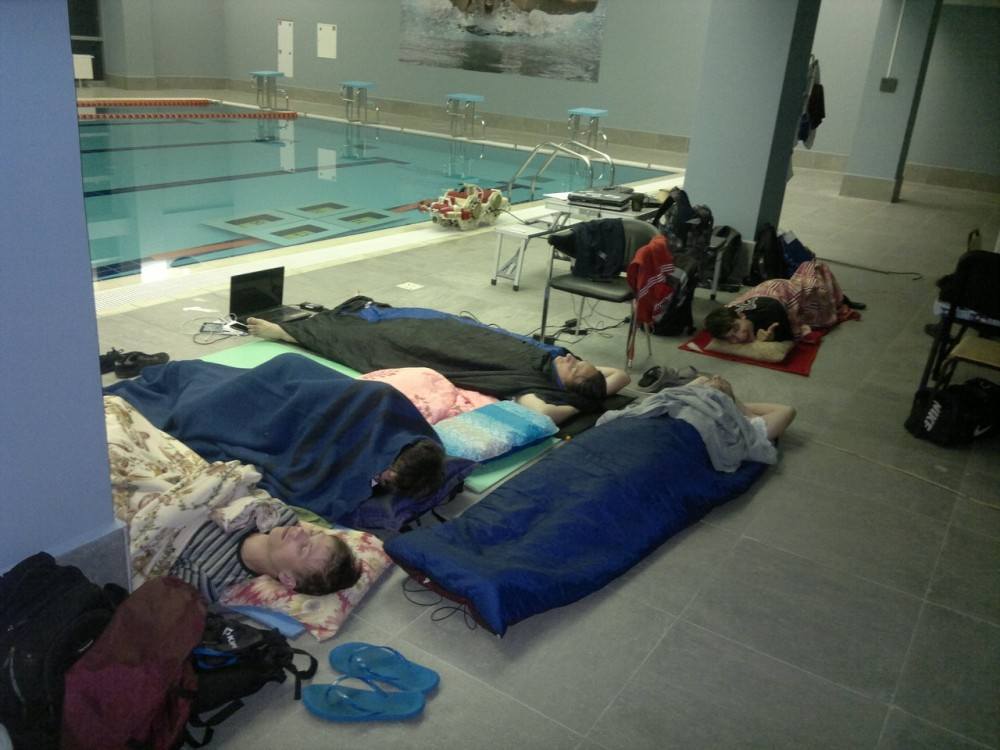
I asked the questions of our Vladivostok team of underwater robotics, they first very reluctantly answered, and then they were not stopped ...
Q: How often sat at night (in the pool :)?
Tufanov: When I was on the team, it was always the same story. During the year, everyone is busy studying, postgraduate, etc. and there is a very slow work. Programmers (I am speaking on behalf of the programmer) design how they will rewrite all the software this year, what kind of cool auxiliary utilities they will have, etc. Then the pace is slowly increasing, and 2-3 weeks before the competition, the apparatus itself appears (in hardware), and then it is no longer up to the auxiliary utilities. You “germinate” in the pool for days (that’s why we called it “germinating”) and append the top-level code (actually, the logic of passing missions), select parameters and all that. Usually, you do not spend the night in the pool, but just leave late (after midnight), but we usually spent the last one or two nights in the pool (photo in sleeping bags from 2013).
Andrei Sakharov: One of those wonderful photos that will never be published on official websites and in beautiful magazines, but which reveal the whole essence of the preparation for the competition :).
In the pool to sleep, of course, something else is fun, but this has its own unique romanticism and elements of team building. When the "end is near" the pace becomes really percussive. Due to the late appearance of the apparatus, plans usually shift, so many dreams of an ideal code remain unfulfilled and are carried over to the next year. But, thanks to our experience of working in such a limited time frame, it is easier for us to solve the problems that arise at the competitions themselves, when there is a lot of stress and there is no time at all. As one of our leaders once said during another sleepless night just before the final: “Oh, but it would be good not to eat or sleep at all! How much would we manage to do then! ”
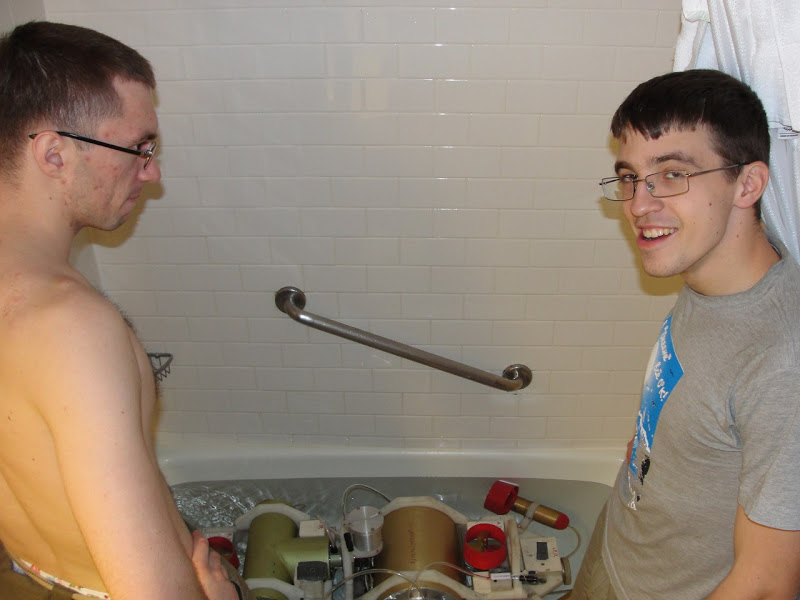
Debugging apparatus in the bathroom of your hotel room. year 2012.
year 2012
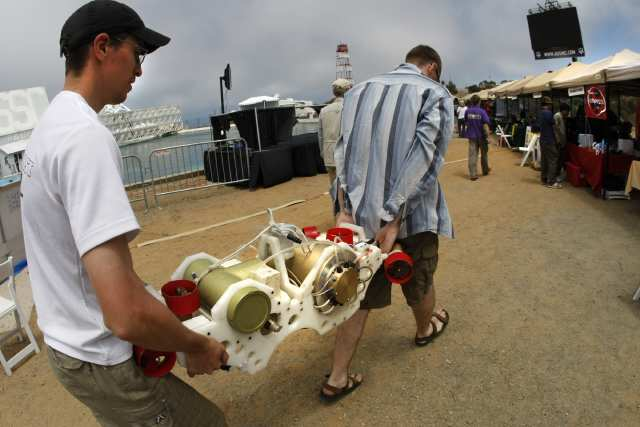
RoboSub competition (article in the LA Times )
Q: Were you satisfied with your results of the first competitions of 2012?
Tufanov: In 2012, we were not even sure that we would reach the final, so the 5th place for us was a pleasant surprise. In 2013, we were much better prepared, so 3rd place was quite natural.
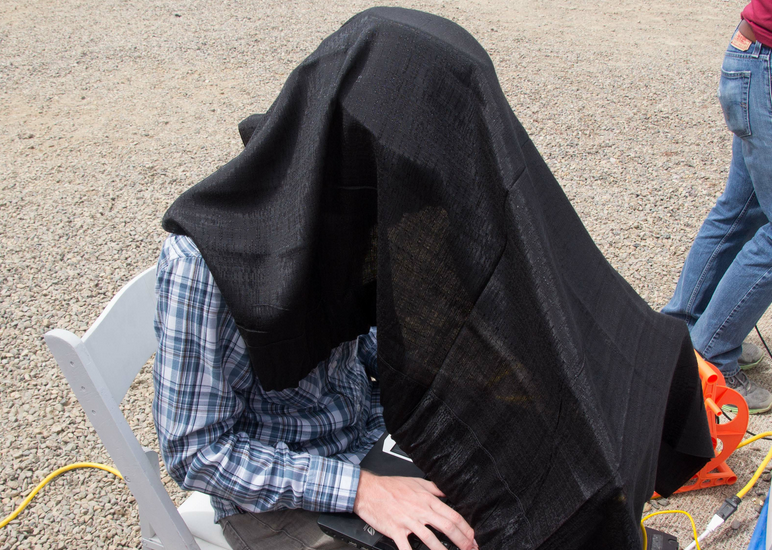
Q: How to debug the software on site?
Tufanov: In 2012, we participated in Robosub for the first time: programmers were inexperienced, the software and the device were new. I remember how Fedya corrected hydroacoustics, which stopped working, as it turned out, due to the fact that they changed the frequency of data transmission from the compass. Logically, these things are not related, but physically, as it turned out, how else.
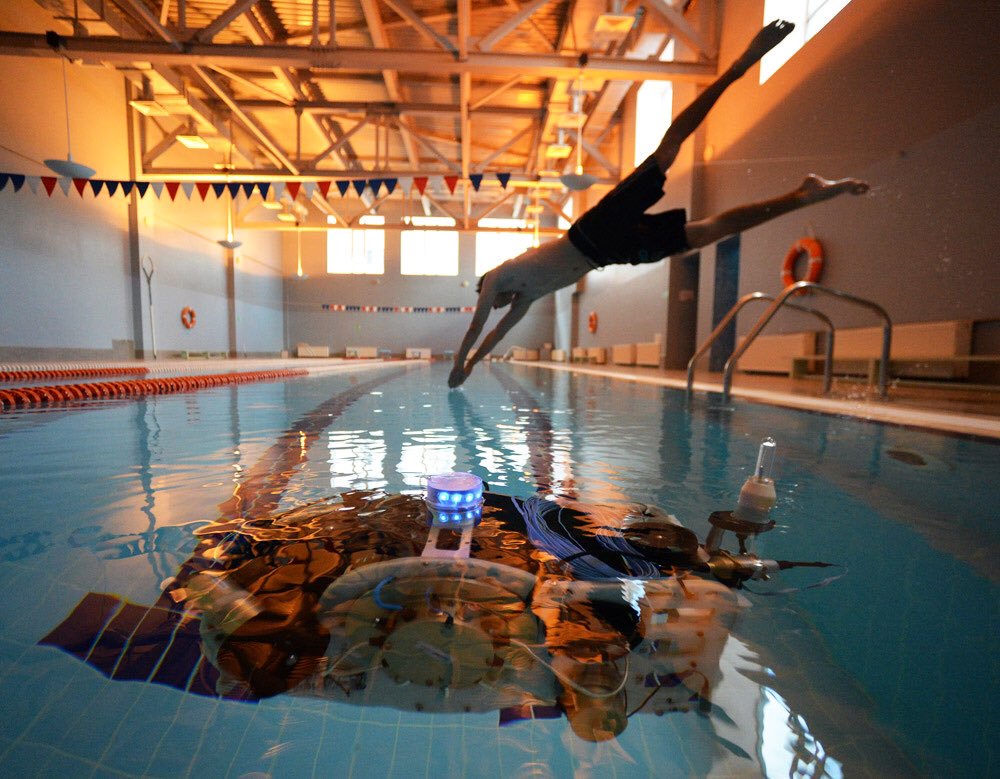
Another common problem is vision. Usually, both colors and lighting are very different from what people see in their indoor pool during a workout. Therefore, training swims - this is largely a collection of data for sight. Some teams in the end there are two config for view - under sunny weather and under cloudy.
Andrei Sakharov: Indeed, during the first launch, we always asked the diver to simply guide our device through all the mission tasks in order to collect photographic materials to customize the recognition algorithms. I still have gigabytes of memorable photos of buoys and targets.
Q: What most often breaks / leaks / buggy?
Chemezov: To be honest, our apparatus is less or less well assembled. There were no problems with tightness. There were two problems - there was something with hydroacoustics and with battery charge (you should always check in advance).
Andrei Sakharov: Electronic engineers generally take care of batteries as if they were their own children. We have very good designers, so there have never been any problems with leakages. But how other teams manage to launch machines with cases made from breakfast containers, for me it still remains a mystery.
About programmers.
Chemezov: It so happened that there is a rule: programmers are forbidden to touch the device , only to watch, and if anything - to help transfer.
Not more.
For example, at these competitions, when our mechanic left to eat, the programmers decided to restart the router. We decided to turn it off, but instead of turning it off (like an outlet), they unwound it, and dropped the protective cover in the sand! This thing should be generally clean, so that the protective gum does not kotsali!
About food.
Chemezov: A story from past competitions. Although the World Cup, there is no normal power system. “Buritosnaya” comes and tries to sell you a burrito. There, such a one-and-a-half-meter Mexican looks down on you with a look: "Eat your fucking burrito, dirty gringo."
Or you can buy a bad sandwich. True, then every day comes another new kitchen on wheels (vegan food was best).
Q: What set of screwdrivers, soldering irons and files did you go with (what should you take with you)?
Tufanov: The mechanic / electronics engineer should answer this question. I know that you need to have a soldering iron at 110 volts. He or remains from last year, or bought on the spot, or you can ask him from the other team - they usually do not refuse.
The list of things in the ZIP from Ivan Chemezov
- Klava with usb
- Soldering iron, solder and rosin
- Multimeter
- MGTP and pilot
- Spare electronics unit
- Screwdrivers (and that hyper large infinity screwdriver)
- Spare hub and hydrophone
- Katyushka communication
- Documents from the device
- Roulette
- Probe Source
- Lead and buoyancy
- 2 bullets and protection of connectors, fasteners bullet
- Fixture a lot, m5, m4, m3 and other models of BMW
- Keschi for setting the compass Anton
- Screw protection
- Comp kulraner and this nonsense with which they do not know how to work
- Pump
- Compass spare
- Bumper and tubes at 8 and 10
- Battery Charging
- Insulating tape and tape, only yellow tape
- File
- Straight arms
- Supervisor Programmer
- Usb wifi
- Magnet
- The wire will flicker
- 3 steel balls for circus acts
- Glass fiber
- Phone charger
- 110V transformer
- Spare camera
- Motor and screws
- Screwdriver
- Powered by Poe Lan
- Hdmi wire
- Scissors
- Nippers
- Hammer
- Do not forget the brains
Andrei Sakharov: Already several times it was such that some of the baggage is lost for some unknown reason during the flight (in fact, when you have 3 transplants on your way, it is no wonder), so it’s better to take one more spare device right away.
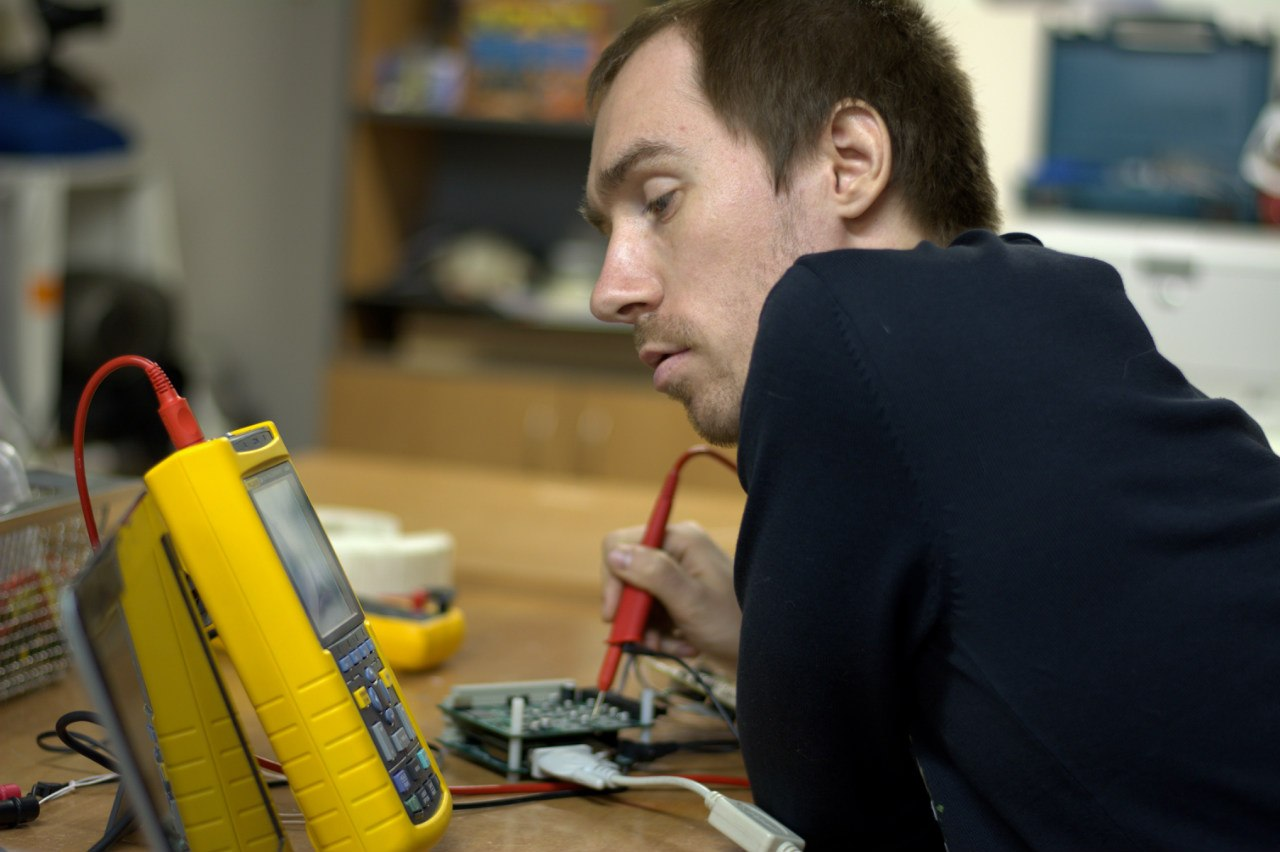
Q: Do teams help each other in competitions (spare parts, tips, etc.)?
Chemezov: Yes, so when we needed a hammer, we went to the women's team from Texas, and when we needed a female lacquer, also to them. But they did not have lacquer, so they had to ask the harsh, bearded men.
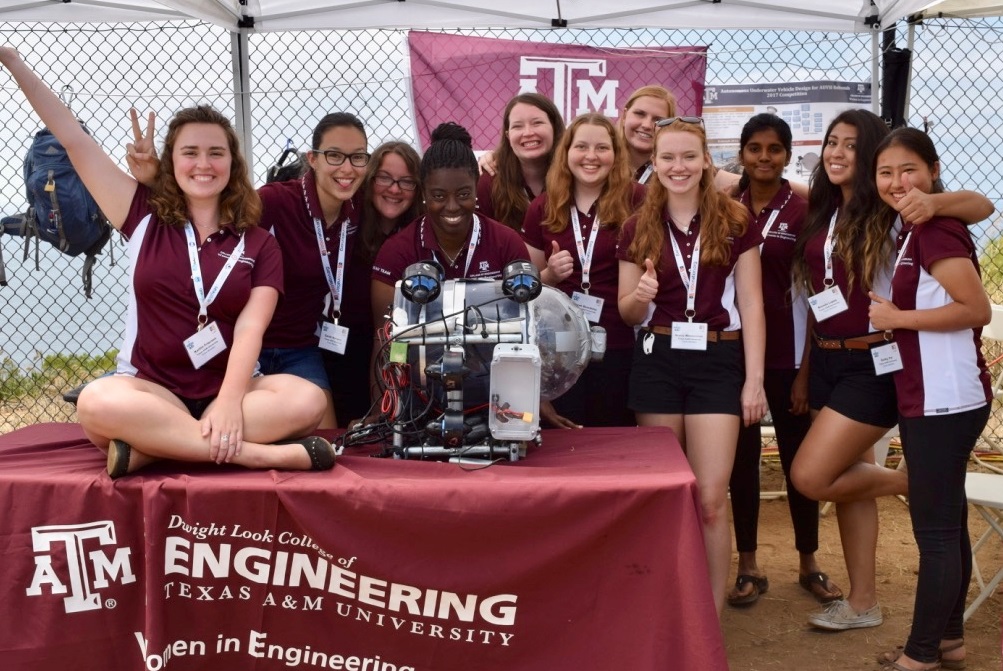
A team of girls from a female college in Texas. Remarkably, everyone can learn in this college.
Andrei Sakharov: An incredibly friendly atmosphere always reigns at competitions! True, I almost did not communicate with people myself, because after the very first test run, a lot of work always appears, especially for programmers. So all the proposals “Let's party hard, comrade!” Had to be answered with a polite refusal.
Q: How do you communicate with other teams after the competition?
Chemezov: I still communicate with people from another Russian team. So, one of the members of our team smoothly joined their team. And, of course, the organizers send us various letters to which we do not respond. The only thing left a review in their book of proposals.
Andrei Sakharov: Of course, after the competitions, new contacts always appear, but we do not communicate very actively. The only exception was the team from Singapore, with whom we became friends after the first Singapore competitions. They fed us and “chili crab”, and drove around the city and laboratories on excursions. Wonderful guys. Then we even shared information about who is preparing for the World Cup, but of course, they did not reveal the secrets :).
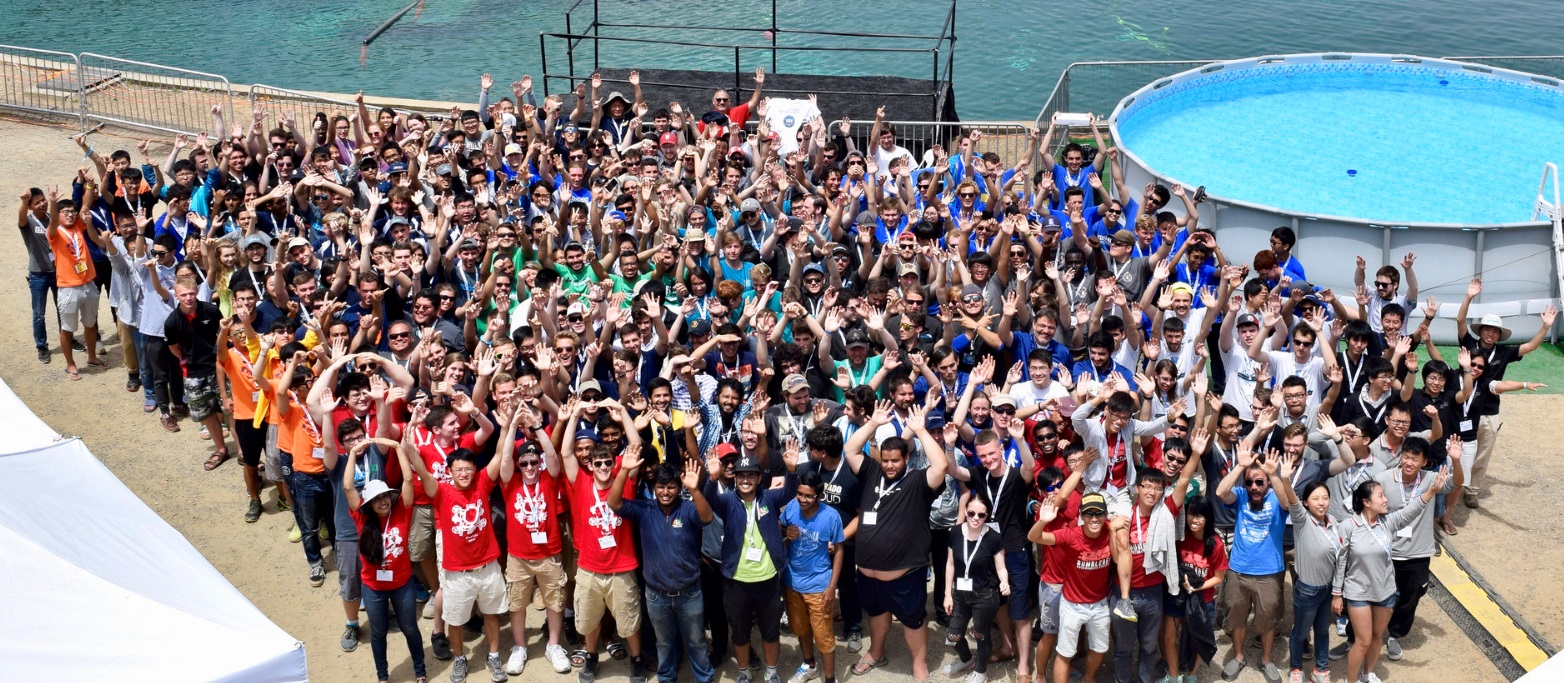
History from Maxim Sporyshev
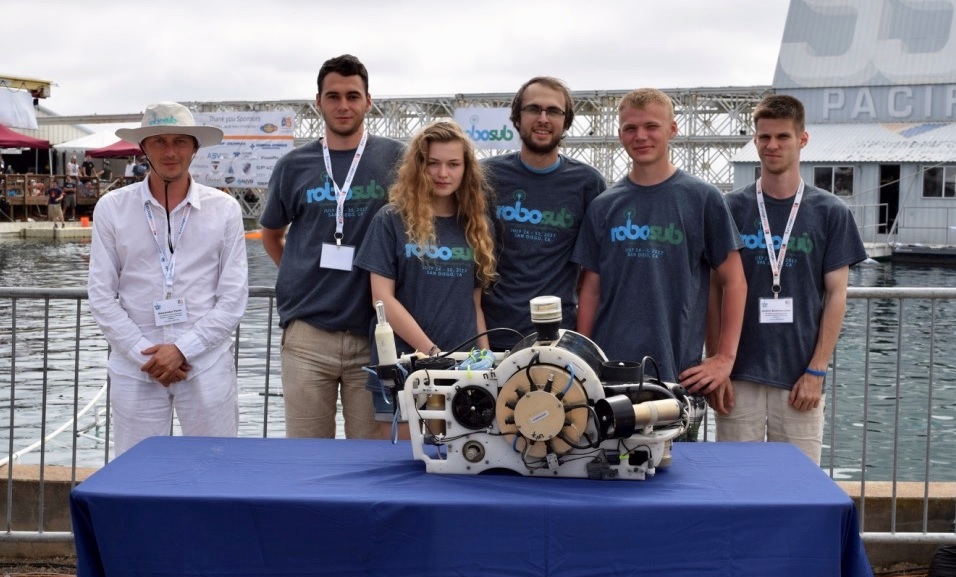
Max is third from the right.
All the funny cases with us, as a rule, are the same and consist mainly in the fact that something breaks for some unknown reason, because of which nothing works at all and we are being repaired at some last moment. before starting and everything ends well (not always). I'll tell you a couple of cases.
One occurred in 2016 - the only time we did not reach the final.
Then we had a lot of problems, because to the last, we didn’t know at all whether we would go to competitions, and therefore we didn’t have time to prepare well. As a result, for the first semi-final attempt, we have not yet corrected all the errors in different places in the software and safely failed it.
The failure in the second attempt was due to the fact that the acoustics module was not heard by one of the 4 beacons used in the competition. He got to us and got caught.
After two failed semi-finals, the jury decides to give a second chance to the teams that have not passed. That year, even last year’s world champions and several other strong teams from China and Singapore failed to break through the semi-finals.
The chief referee said that on the day of the final each team will give one more start before the finals (20 or 30 minutes for each team). Only one will reach the final - the best. But on condition that he scored more than 4000 points.
For comparison, the teams with half the number of points passed through the semi-finals the day before. And since we had hardly prepared everything at all, we did not expect to recruit so much at all.
To do this, it was necessary to urgently write the logic of complex tasks, and hope for a miracle that without preliminary tests it will work during the last chance (the last run).
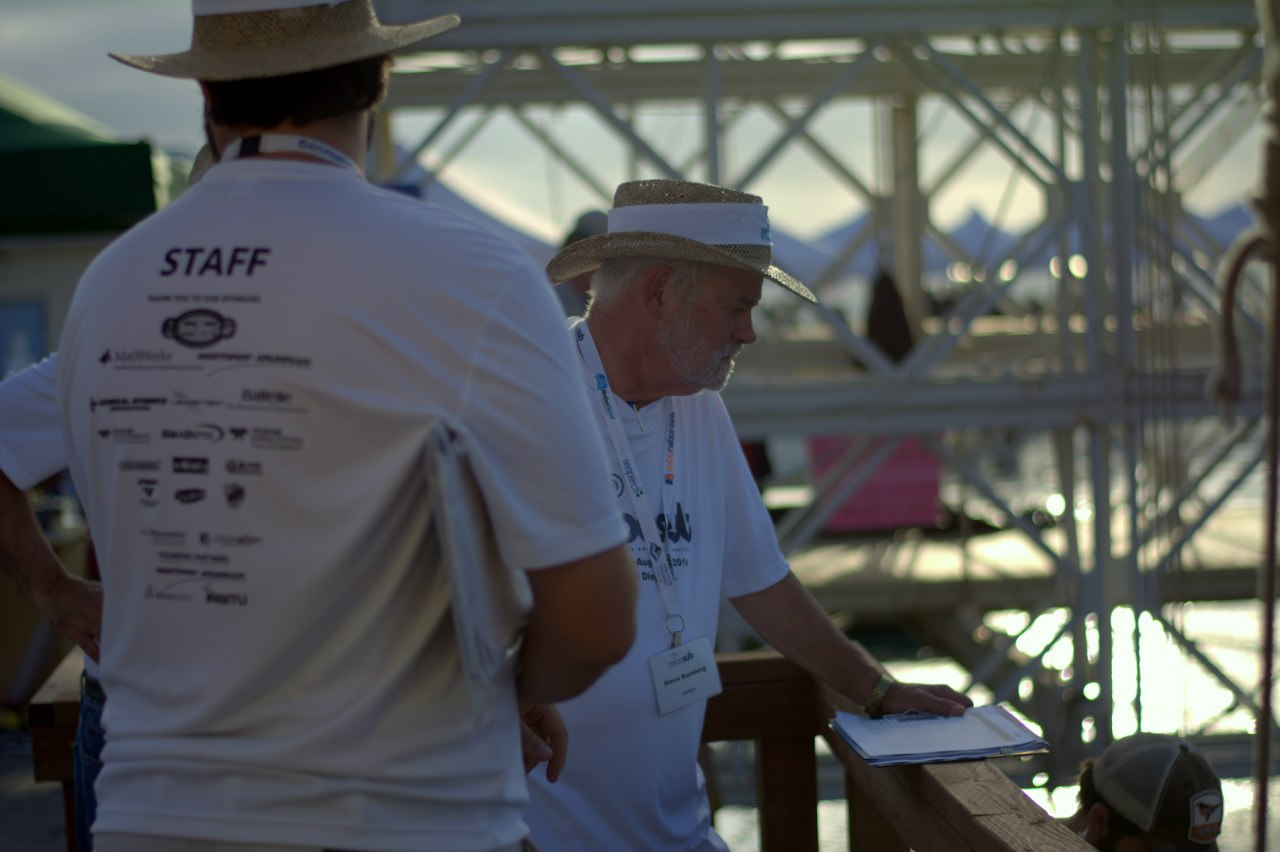
Judges.
One of these tasks was the following. The jury accidentally included one of two lighthouses, each of which had its own task. The device, when entering a random beacon, must itself guess what task it is in its area and successfully cope with its part. In this case, they will give not only points for a partial task, but also points for correctly navigating through a random beacon (about 2000 points).
There was nothing to lose, on the last evening we wrote everything that was required and conducted a couple of tests in a 1.5-meter-high splash pool in a hotel at night. In the morning, I was worried more than ever before, and besides, we knew that we were competing for 1 st place with very strong teams that, like random shoals, also, like us, did not reach the final, but have great potential to do much more than we are
Only one team passed, even if we scored 4000 points (by the way, we didn’t score that much, even when we took 3rd place in 2013 and did a lot of things). We saw a couple of last year’s strong teams unsuccessfully running their launches. And here was our launch, which, unfortunately, begins very badly and the device then crashes into the goal post, then misses the buoy.
We have to restart the device and now there is only one time left and the device starts to pass everything (at the end we made the last edits and the device starts to pass everything) and fortunately he copes with the task of the beacon and we have more than 4000 points in our pocket. We could even go ahead and do another task, but we just ran out of time.
It was relieved very much, it was very joyful, we did not only fulfill the requirement of the jury, which seemed incredible, but with such a result it was also possible to claim a high place in the future finals (more than half of the teams that reached the final did not score 3000).
After us was the launch of only two strong teams - China and Singapore. Singapore did a good start, but because of some kind of mistake, you need the number of points they don’t gain.
China remains. And no matter how much we want to reach the final, they begin to successfully complete tasks from the very beginning of their time. They did it rather slowly, but they had enough time to do not only the same thing as us, but also another task that we did not have time to do.
As a result, we scored a huge amount of points. Such as they never did, but they did not even reach the final, which was an absolutely disastrous result. The last slot in the final takes China.
Just a couple of hours after these launches the finals begin and the Chinese got the first time and it is not clear why. It turned out later that they decided to fix something, their apparatus just went to the bottom, I don’t remember, maybe they didn’t even get through the first gate. As a result, they took the only slot in the finals and showed nothing there =). It was very disappointing.
In addition, this story was too long to tell it as an excuse. Therefore, we can assume that we just did everything at the wrong time that year.
The following year we were luckier.
And in general, I would like to note that the share of luck at these competitions, unfortunately or fortunately, is very large. A lot of things can happen, the device is used with such intensity as it was not used before. And the team needs to be able to deal with problems as soon as possible and in a high stressful situation.
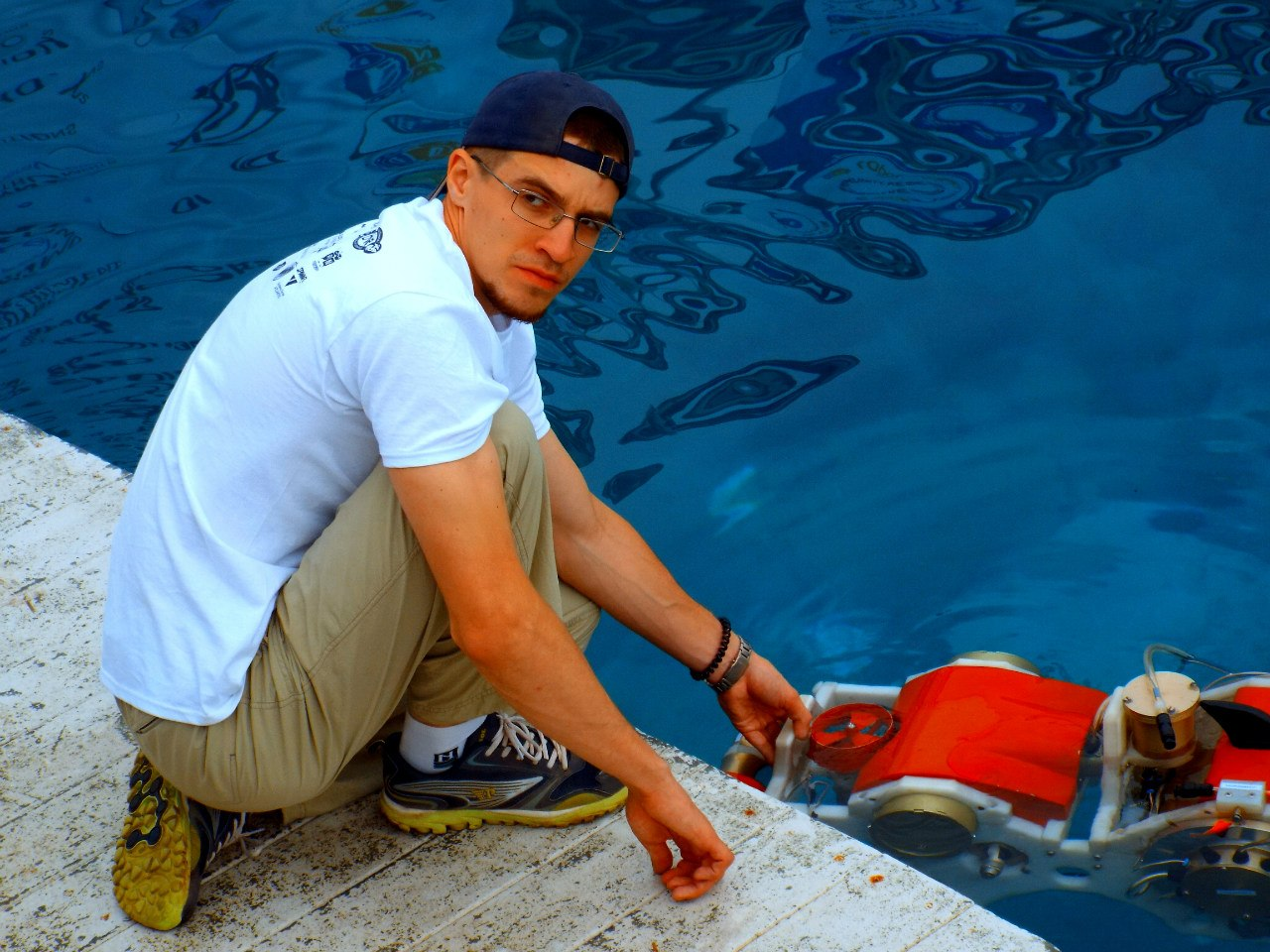
Kolyan wolf looks at programmers :)
The story of Vanya Chemezov
I was, is and will be soon - an electronics mechanic, a toast-maker, a handyman-loader of the apparatus. In short - not a programmer (what I am proud of).
Igor Tuphanov: Yes, programmers often have such an attitude :) It is believed that they cannot do anything with their hands, and in general this is true. When I was on the team, there was a rule that programmers were not allowed to climb into the device. Only very experienced, and only to change the battery.
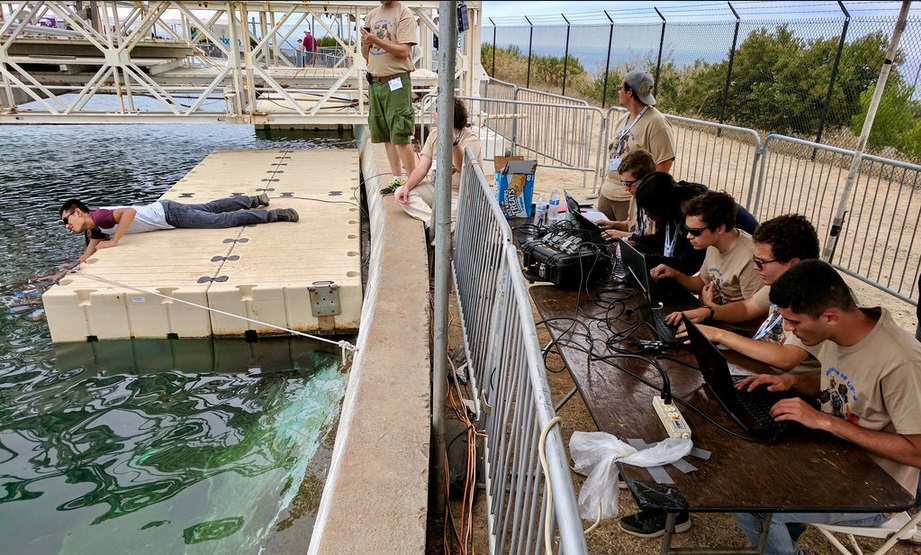
The distribution of roles.
Interesting moments were the sea and a small puddle. We were very interesting passing through the border (in both directions). During the trip there was a special briefing:
“In LA, all people are pumped up, licked. Therefore, be prepared for the brutal macho border guards. " And indeed, at the customs with a battery, the conqueror of women's hearts approached and, in a voice that was as soft as velvet, said: “What is this about you (pointing at the battery), can I see? Mmm, heavy ... I will borrow it for a short time from you, do not be upset. ”
Whatever we were trained, it was still a very severe test.
We settled in another hotel (apart from the rest of the teams), so we are not involved in the oil leakage in the pool of their hotel. In general, the rules do not allow the oil to fall into the pool (we have no problems with this rule).
We had to crack our own numbers.
We are the only ones who launched the device from an iPhone (and in general our team can safely advertise Apple).
Kaltek team very strangely managed their offspring. Their apparatus pranced like last time. And the captain of the Cornell team was again thrown into the pool (Coincidence? They have a new captain every year).
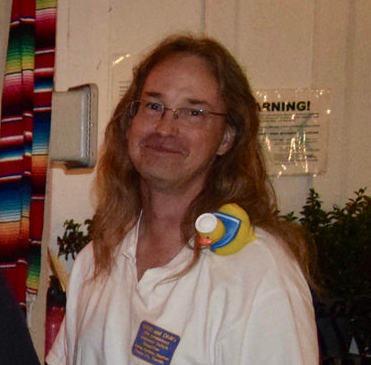
The main organizer (Dave) this year wore a rubber duck on his shoulder.
And the Hindus apparatus, instead of "shooting a torpedo at a squid," decided to ram it at full speed.
We also realized that Wi-Fi works only if it is wound with YELLOW scotch tape.
Now we already know that the problem was in the curved build of the D-link router. In this world, there was another marketer besides me.
Sometimes we liked to sit until 3 am and look for a problem where it was not there. For example, we tried to seal a sealed hydrophone for a very long time, then unsolder and solder it back. As a result, the solution to the problem is to close the unfused wire.
History from Andry Sakharov
If you need a story, then the first thing that comes to mind is 2013, when at the San Diego airport we found that we had a bag missing, which contained one of the most important parts of the device ... and all my belongings.
Many parts and tools can be found in our spare parts, local stores or even borrow from other especially welcoming teams, but here’s the Doppler lag, without which the device cannot determine its location in the pool, and therefore it’s impossible to fully complete the mission. .
We picked up the airport, the organizers of the competition and almost all of the royal army, we all were very sympathetic, but could not do anything - the luggage fell through the ground. Therefore, after we prepared everything we could for the launch, we simply sat in a tent by the pool, felt sad, ate burrito, watched the progress of other teams, accepted condolences and played CPM in anticipation that a miracle and luggage would happen -sight back. They even tried to program some chips that they didn’t manage to do in Vladivostok, but the fighting spirit, of course, was not a damn thing.
And so, when we had already gone through all the stages of accepting the inevitable, and the drawing of the “vouchers” to the finals was close to completion, our leader, with the help of some incredible and extremely powerful magic, as well as his connections in the highest circles, materialized for us An exact copy of a lost relic. We instantly came to full combat readiness (of course!), And for the only attempt that we had, they broke through to the final. Other teams were rather surprised by this development. We certainly didn’t perform perfectly, but for such a hardcore - very good. But my pakman shirt was never found.
Divers
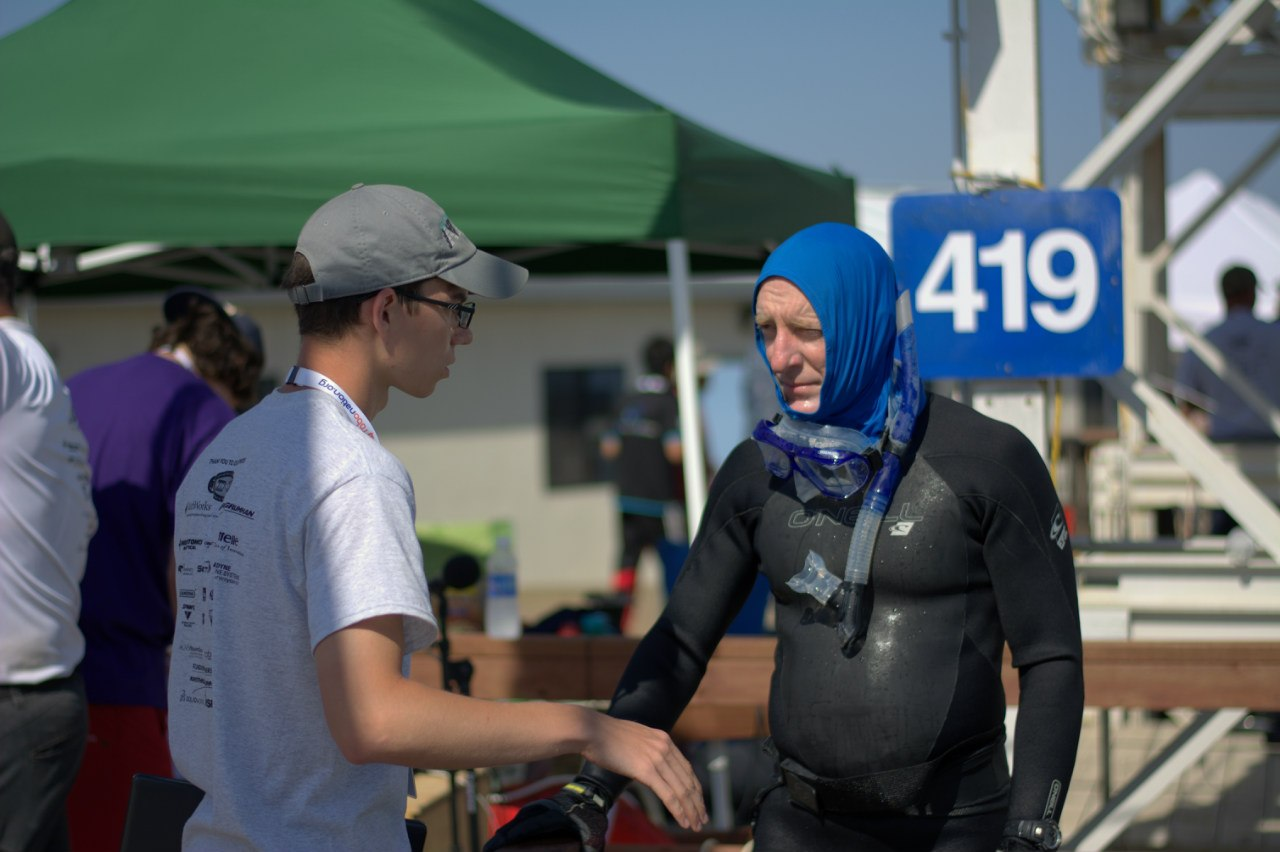
Instructions to the diver about working with the device in the water.
Tufanov: The pool is large and deep. The device may lie on the bottom and it will have to get it, the device may become entangled in obstacles. It happens that the device must be stopped (use the kill switch, which, according to the rules, each device should have), until it has done trouble. In general, it is difficult and unsafe. This can be done only by specially trained people.
The organizers somehow agree with the Navy (after all, the competitions are held on their territory), and there is always a team of navy divers at the competitions.
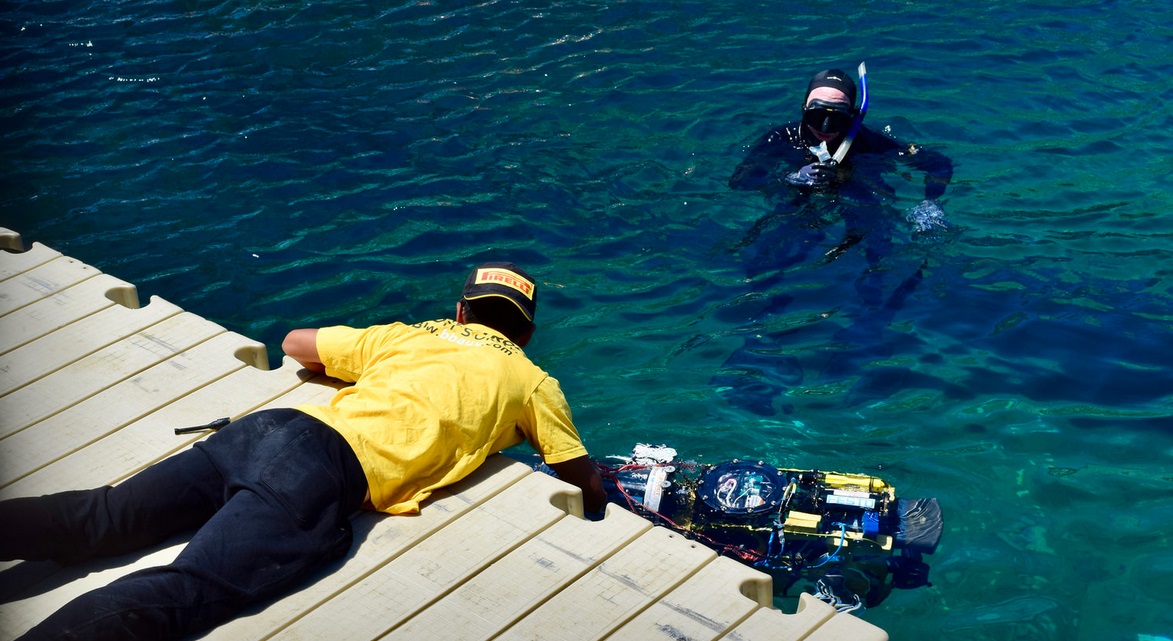
Each time before the device is lowered into the water, a diver is attached to it. The diver gets acquainted with the captain of the team, and he explains where the kill switch is located, where the device is in front of, for which parts of the device you can push and pull, where the torpedoes are located, and what is the approximate plan of action. In the course of the swim, the captain can ask the diver to do anything with the device. For example, give a command to turn off.
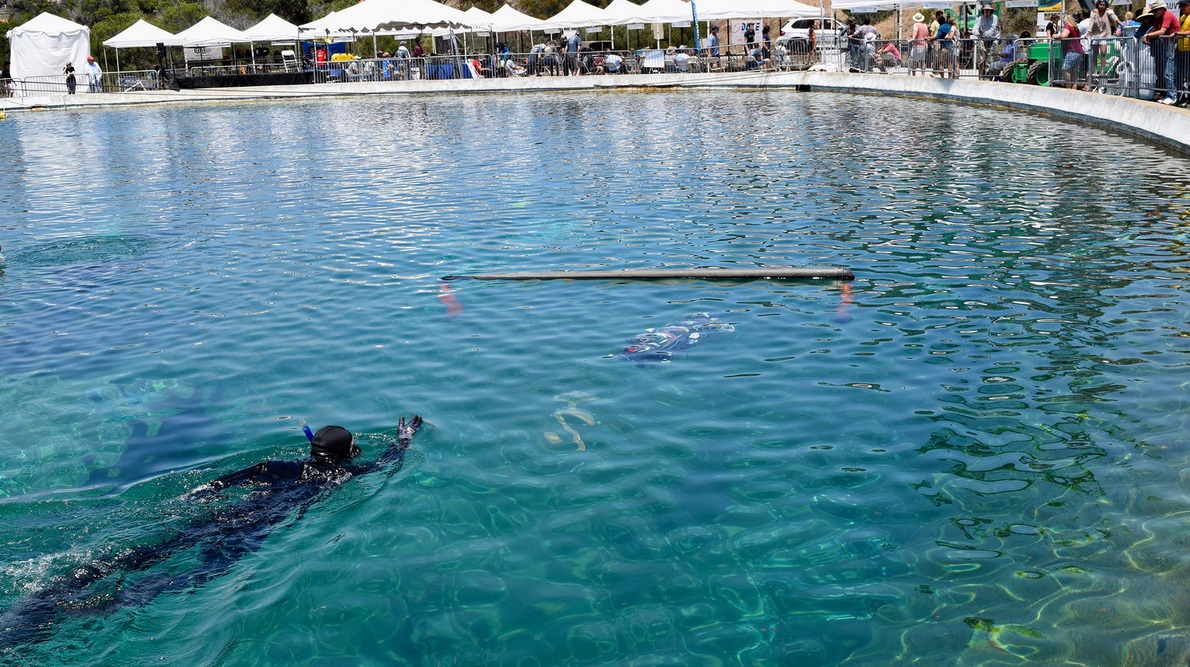
During the training swims everything is possible in principle. The diver can tow the unit to the point that you call. Somehow in 2013, we asked the diver to redirect the working (and going underwater in the wrong direction) apparatus to the desired target. The diver plunged, and having fought with the device, he turned it so that you could see what you need.
It is pleasant to work with divers - they understand everything from the first time and clearly carry out the task. And on land they are funny and sociable guys, always come to the party after the close of the competition.
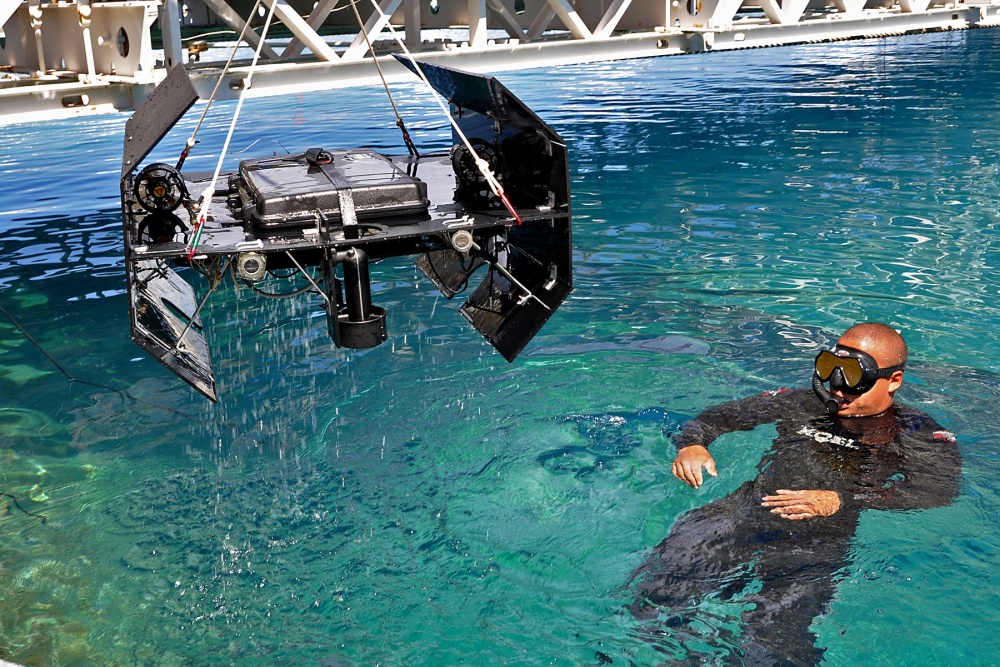
Andrei Sakharov: Divers, although they seem extremely harsh, are actually very good-natured and interesting people. There was a funny case when the diver didn’t fully understand how the kill-switch of our device works and couldn’t turn it off on his own, but he guessed to raise it above the water surface so that we could send a shutdown command via Wi-Fi.
The device all this time is naturally struggling with the engines, raising the spray and trying to deepen. And he has serious, as the diver managed to keep him - I can not even imagine. But he is also a military diver :) And when he returned to the shore, he said something epic like: “I'm already too old for all this!”

Jokes
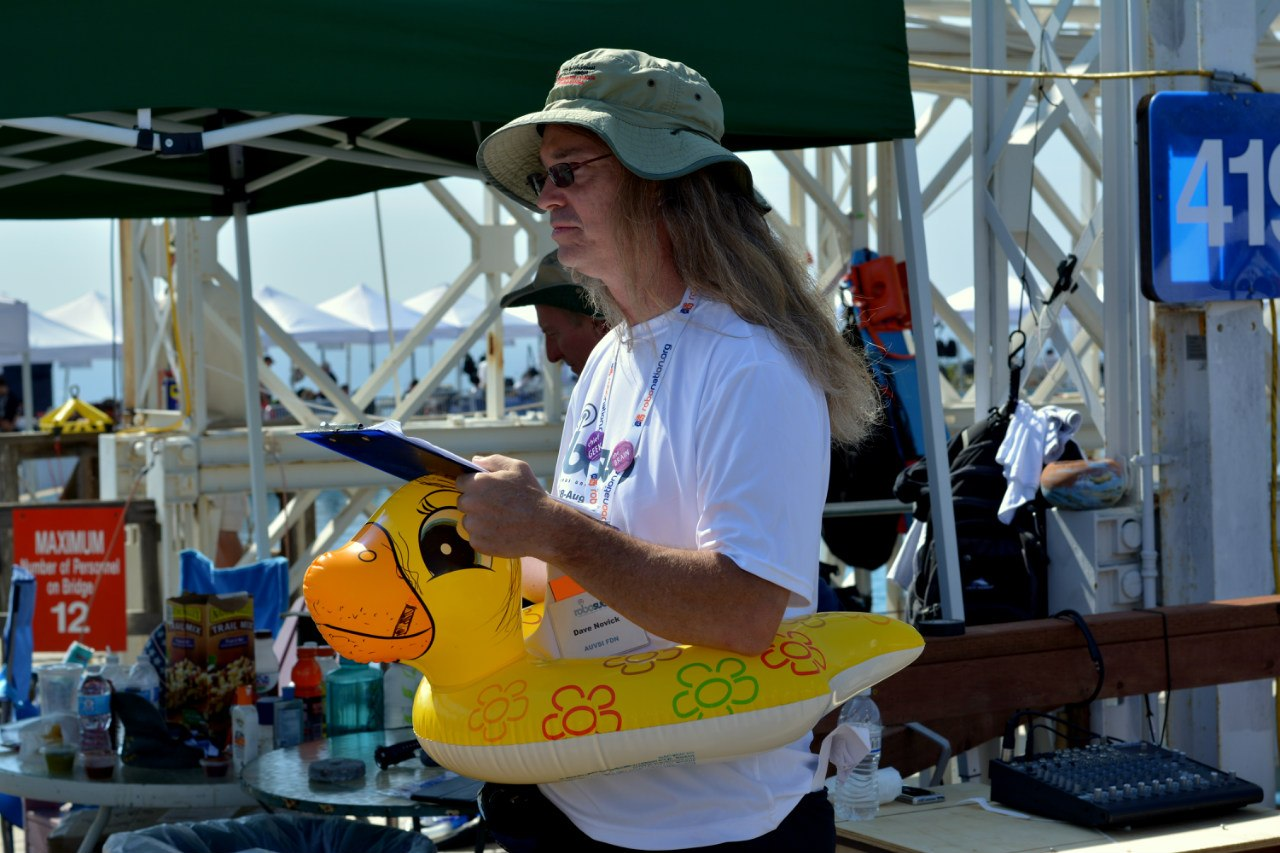
All week, Dave (CTO of Robosab) walked with an inflatable duck.
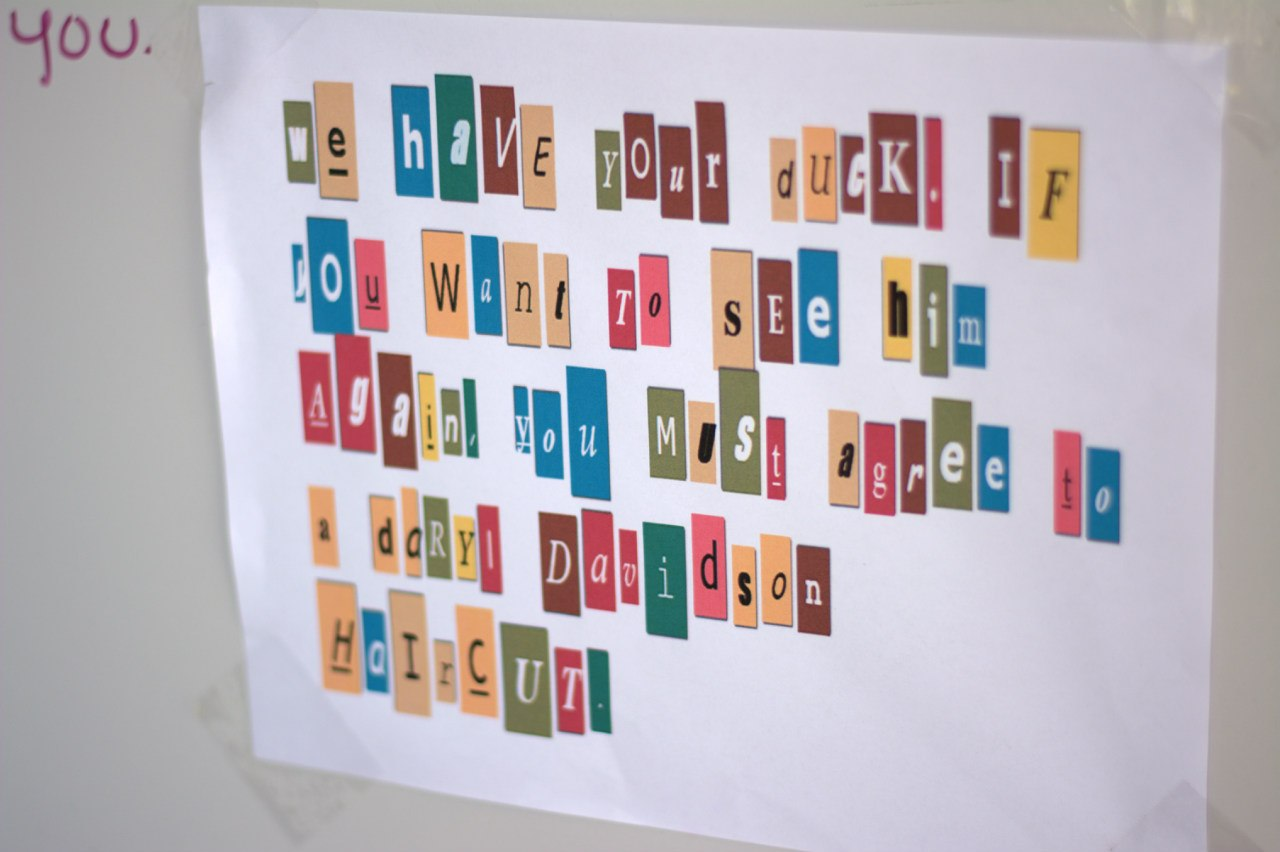
One day, Dave's duck mysteriously disappeared, and a note appeared on the wall with missions ...
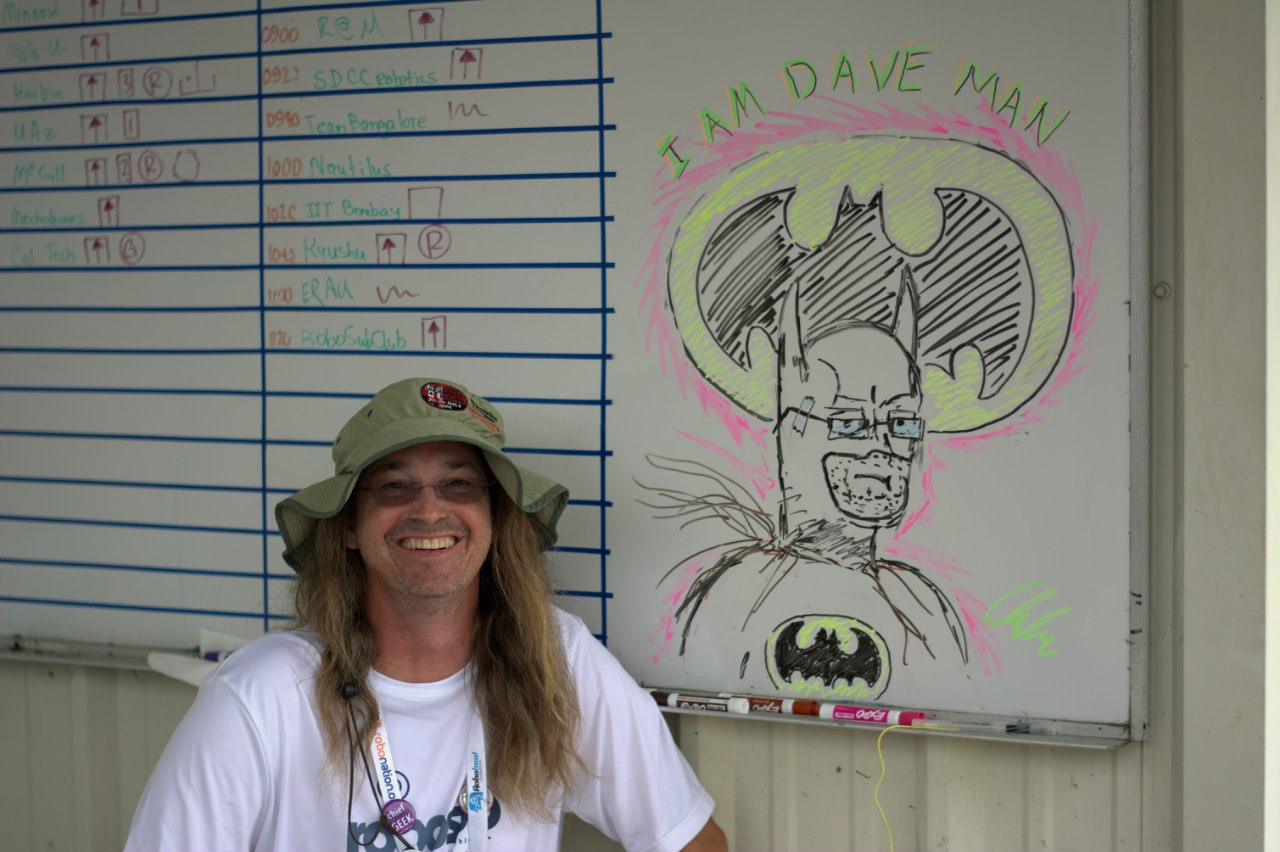
One of the arts on the wall dedicated to Dave, by the way is not the only one))
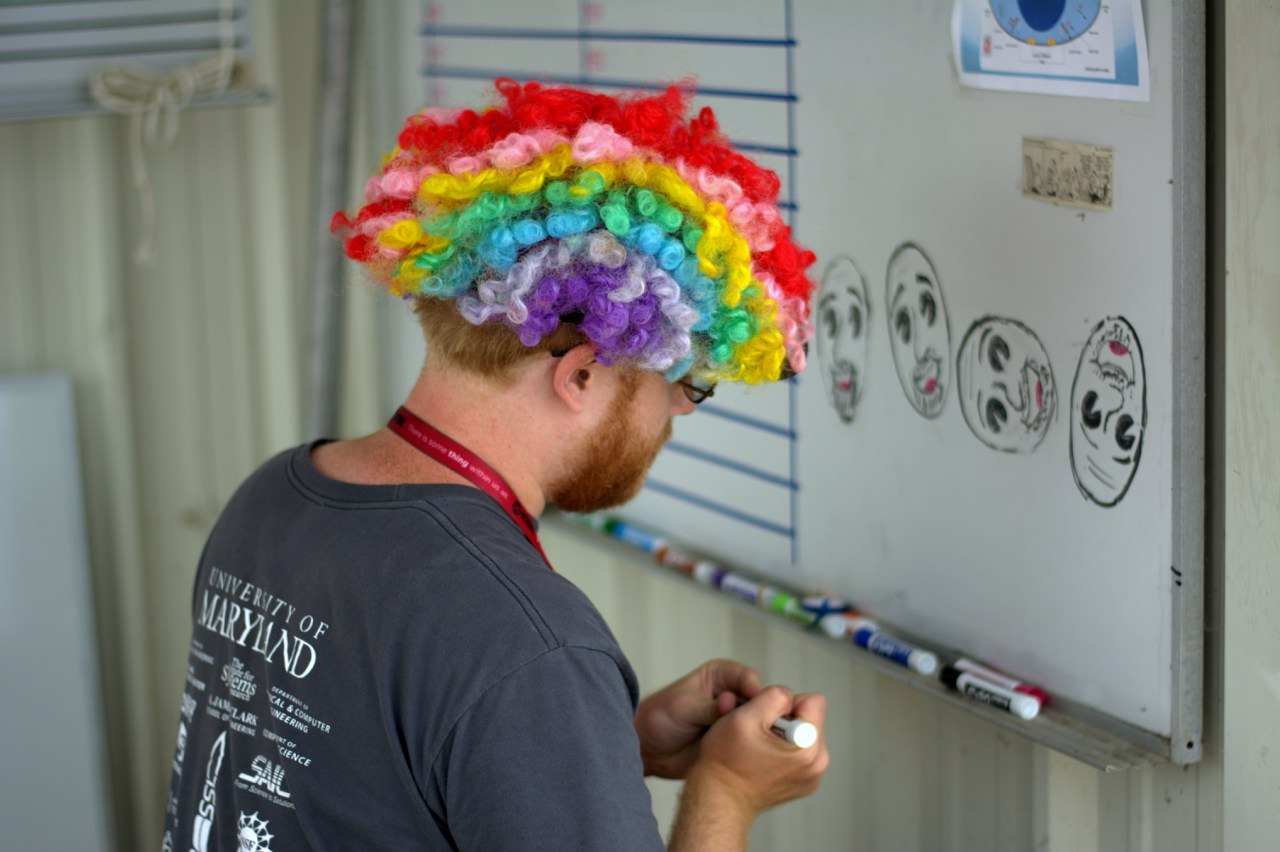
A guy from the University of Maryland draws a board with missions every day.
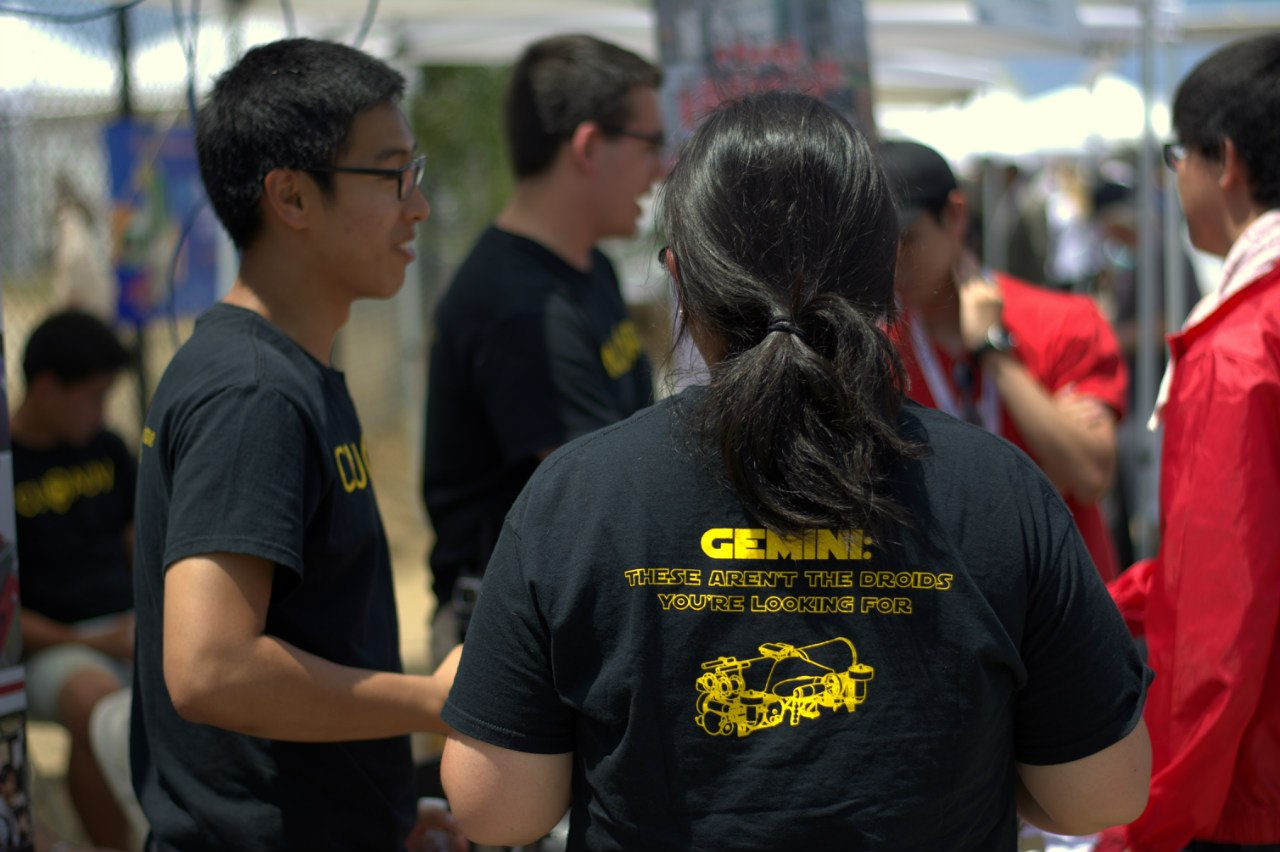
T-shirts from Cornell University have been cheering people for at least the second year :)
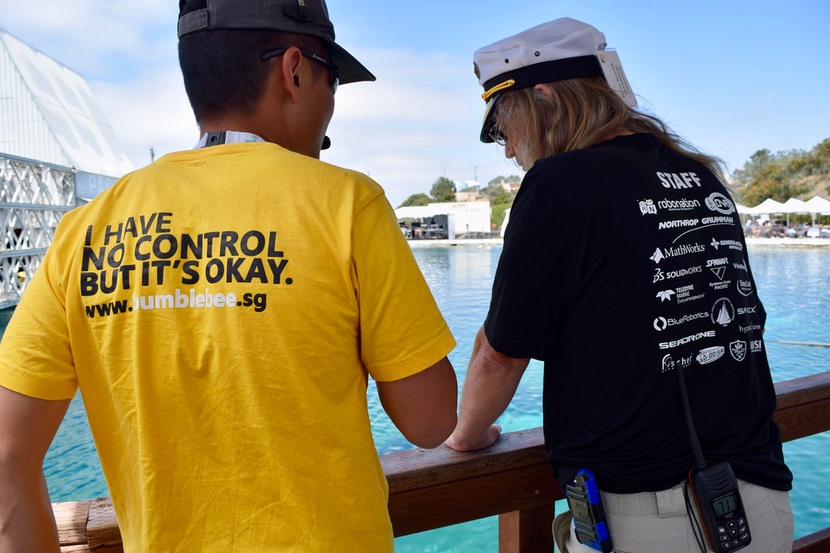
Singapore (NUS) also has a cool slogan: “I have no control but it's okay”.
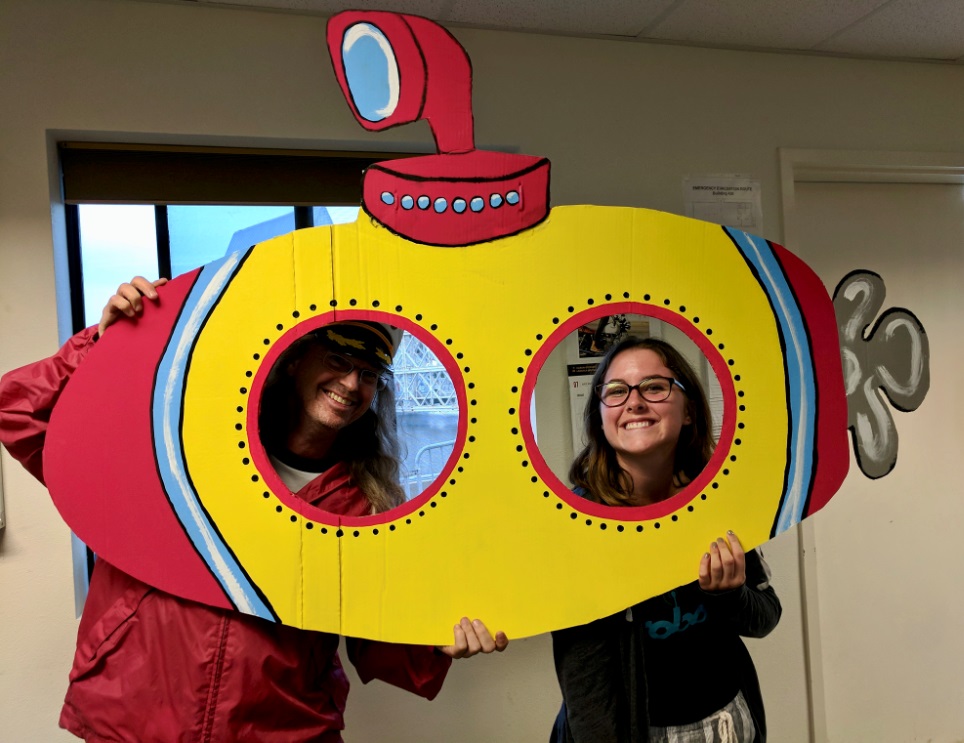
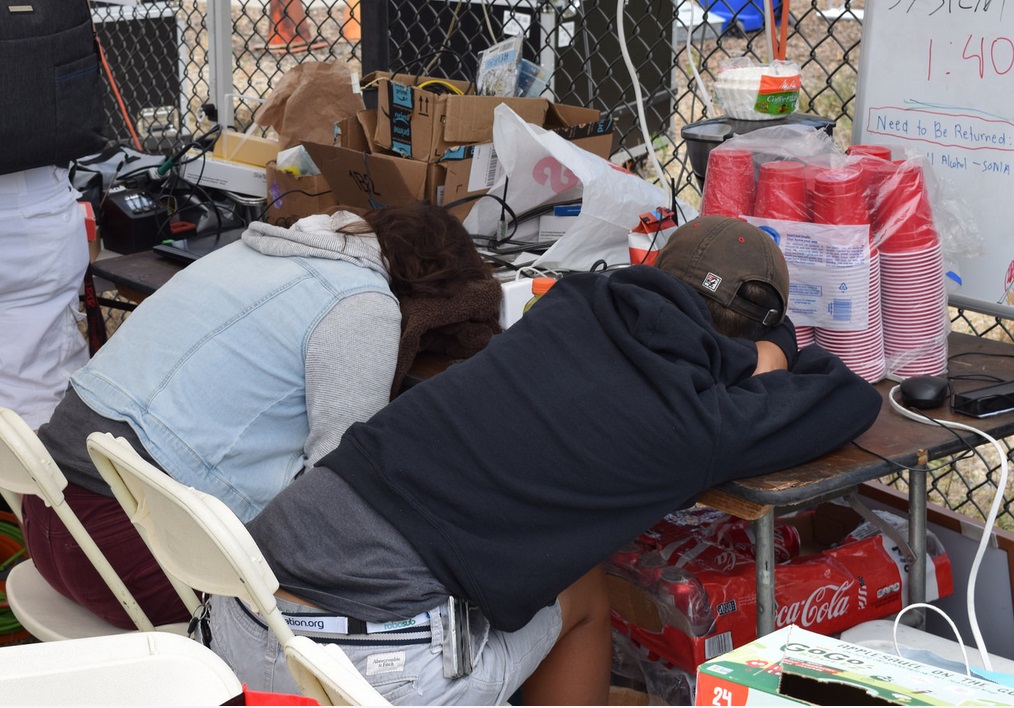
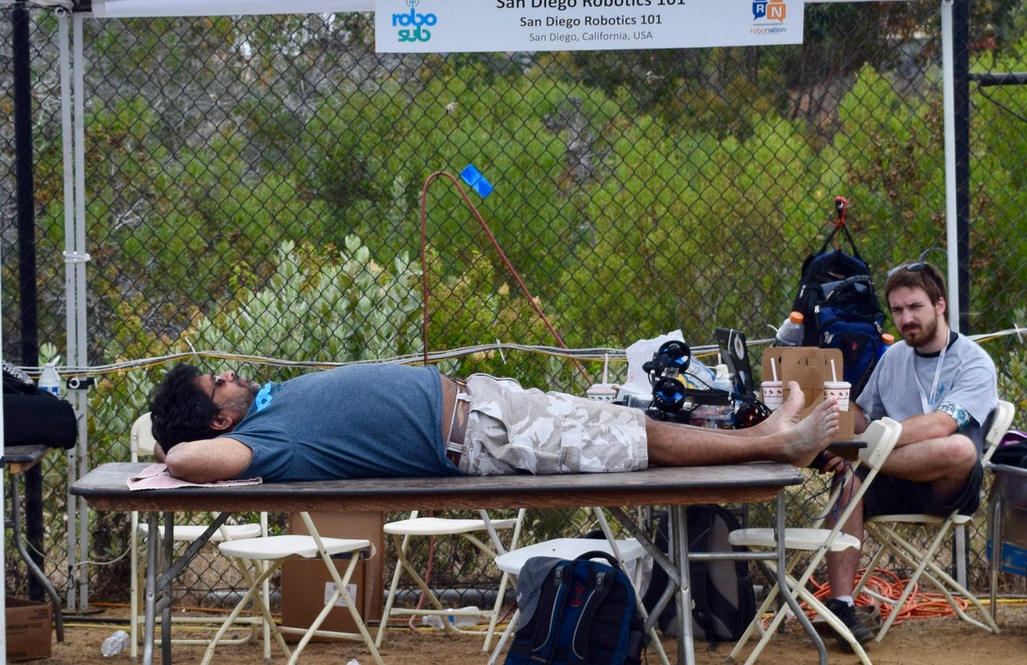
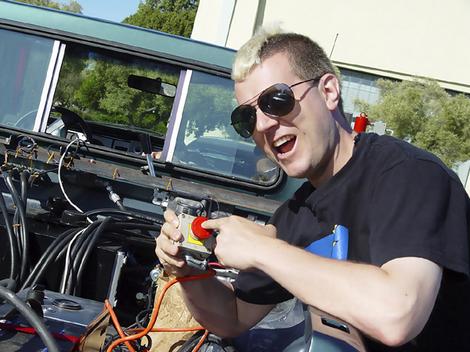
Zoz Brooks is a permanent correspondent and host of the RoboSab. At the time of afterparty, he opens his own barbershop, where everyone can quickly and completely free of charge make a fashionable, but rather specific haircut “like a Goat’s” :)
PS
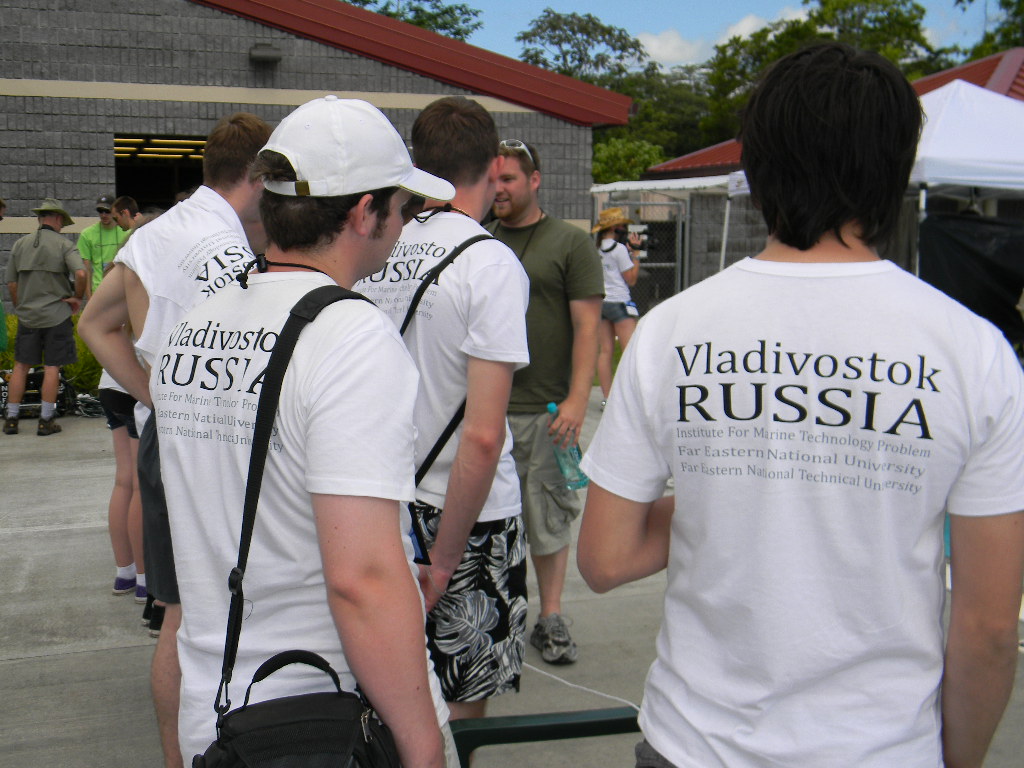
This is Vladivostok, baby!
Read more
All Articles